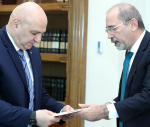You are here
Iran sentences two US citizens to 10 years in prison
By Reuters - Oct 18,2016 - Last updated at Oct 18,2016
DUBAI/WASHINGTON — An Iranian court has sentenced an Iranian-American businessman and his elderly father to 10 years in prison on charges of cooperating with the United States, Iranian media reported on Tuesday, the latest sign of an intensifying crackdown against Iranians with ties to the West.
Iran’s Islamic Revolutionary Guard Corps (IRGC) in October 2015 detained Siamak Namazi, a businessman in his mid-40s with dual US-Iranian citizenship, while he was visiting family in Tehran. The IRGC in February arrested his 80-year-old father, Baquer Namazi, a former Iranian provincial governor and former UNICEF official who also has dual citizenship.
Both men were sentenced to 10 years in prison for spying and cooperating with the US government, said Tehran prosecutor Abbas Jafari Dolatabadi, according to the Fars news website, without specifying when exactly the sentences had been handed down.
The US State Department’s deputy spokesman, Mark Toner, said the father and son had been “unjustly detained” in Iran, and called for their immediate release.
The sentences were the latest against dual nationals directed by hardliners who are powerful in Iran’s judiciary and security forces, in the aftermath of Iran’s historic nuclear deal with the United States and other world powers last year.
Washington and Tehran have not had formal diplomatic relations since the 1979 Islamic revolution that toppled the US-backed shah.
Babak Namazi, Siamak’s brother and Baquer’s son, called the sentences unjust.
“My father has been handed practically a death sentence,” Babak Namazi said in a statement.
Baquer Namazi has a serious heart condition and other medical issues requiring special medication, his wife wrote on Facebook in February. On Tuesday, UNICEF called for his release on “humanitarian grounds”.
Baquer Namazi previously served as UNICEF’s representative in Somalia, Kenya and Egypt. He also ran Hamyaran, an umbrella agency for Iranian non-governmental organisations.
Siamak Namazi, who was born in Iran and educated in the United States, worked as a business consultant in Iran for several years, and was well-known in Washington circles. He most recently worked for Crescent Petroleum, an oil and gas company in the United Arab Emirates.
Mizan, the Iranian judiciary’s official news site, published on Sunday video images of Siamak, set to dramatic music and spliced together with images of US President Barack Obama and Washington Post reporter Jason Rezaian, who was released from an Iranian jail in January after more than 18 months in detention.
The video showed Siamak’s US passport and identification card from the United Arab Emirates, where he previously lived. It then showed him standing and holding his arms outstretched, as if being searched, while being filmed by at least one other cameraman. The website said the video depicted “the first images of the moment of Siamak Namazi’s arrest”.
The father and son were each given a single court session lasting a few hours before the sentences were given, Babak Namazi’s statement said.
Hardline backlash
Iran’s deal with world powers lifted most international sanctions and promised Iran’s reintegration into the global community in exchange for curbs on its nuclear programme.
The potential detente with the West has alarmed Iranian hardliners, who have seen a flood of European trade and investment delegations arrive in Tehran to discuss possible deals, according to Iran experts.
Security officials have arrested dozens of artists, journalists and businessmen, including Iranians holding joint American, European or Canadian citizenship, as part of a crackdown on “Western infiltration”.
Four other Iranian-Americans, including Rezaian, were released from Iranian prisons in January as part of a prisoner swap with the United States.
The arrests have undermined Iranian President Hassan Rouhani’s goals of reviving Iran’s business and political ties with the West, as well as pushing for more political and social reforms at home, Iran experts and observers said.
In a 2013 visit to New York for the United Nations General Assembly, his first as president, Rouhani told an enthusiastic crowd of Iranian-Americans that his government would make it easier for them to visit Iran. He has criticised his hardline opponents, saying they sought their own interests, not those of the Iranian people.
Related Articles
TEHRAN, Iran — Iran announced on Monday that three dual nationals and a foreigner held in the country have been indicted on unknown charges,
TEHRAN — Iran's top diplomat said on Sunday "everything is ready" to implement a stalled prisoner exchange deal with the United States, thre
BEIRUT — An Iranian-American detained in Iran since last summer has been released on bail of approximately $60,000, the Human Rights Activis














